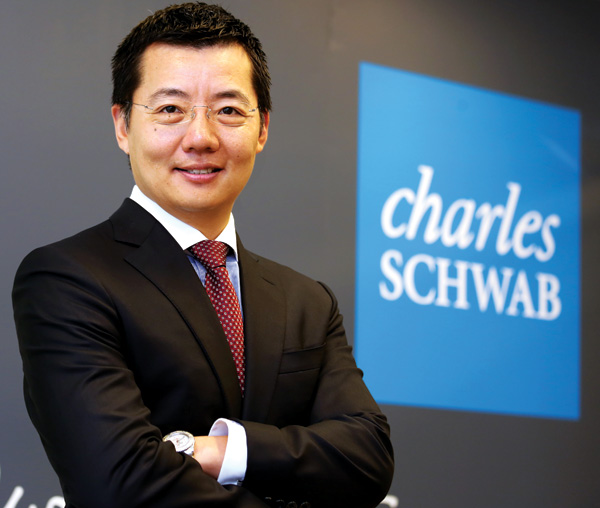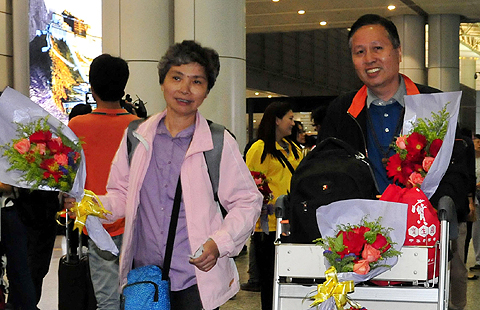Leading the field on faith
Updated: 2015-04-24 16:22
By Luo Weiteng(China Daily USA)
|
||||||||
 |
|
James Sun has spent his entire working life at Charles Schwab, first in the US and now leading the Hong Kong office, as corporate beliefs at the brokerage resonate with his own. Parker Zheng / China Daily |
Charles Schwab placed its trust in Hong Kong at a time when foreign investors were eager to flee. Eighteen years on, it is being proven right. Luo Weiteng gets the story.
An "adventurer" - that is how Beijing-born brokerage whiz James Sun likes to describe himself.
The Charles Schwab Hong Kong managing director, an out-and-out Beijinger, born and bred, set off on his US expedition as a student more than two decades ago.
Next came watching his career take off with the San Francisco-headquartered Charles Schwab Corp and, after 17 years at the brokerage house and banker's New York offices, Sun packed his things once again and moved to Hong Kong in 2004, to take charge of Charles Schwab's entire Asian business.
His firm was already a few steps ahead of him, having landed in the Eastern hemisphere's international metropolis a good seven years before.
Charles Schwab entered the Hong Kong market in 1997, the year of the handover and the Asian financial crisis. That may not have seemed like perfect timing, especially as foreign investors were rushing to withdraw capital from the soon-to-be-former British colony.
But despite the perceived flux, Charles Schwab remained bullish on the prospects of Hong Kong and the mainland, and placed its bets on the city as a long-term wealth management bridgehead for business expansion in Asia. "Our entry (into the region) at that time stood as an act of optimism and a vote of confidence for the outlook on Hong Kong and the mainland," said Sun.
"It also stood as proof of our long-term commitment, in a bid for long-term participation in the development story of Hong Kong and the mainland."
More importantly, the mainland was at the time experiencing a situation somewhat similar to that undergone by the US several years back.
The world's largest economy, boasting a huge investor base like the mainland did during the late 1990s, had then seen a huge market gap where emerging affluent investors wanted to handle their money wisely but had no idea about how to do so.
Charles Schwab believed such a gap was and would continue to be the hard fact on the mainland, where the brokerage's know-how on the issue, which proved a winner in its native US, may be given full play.
"We spotted the exciting market possibilities and felt we really needed to capitalize on the explosive growth in the region and be part of the compelling story of a booming economy," said Sun.
"Eighteen years on, it has been proven that we made the right choice to use the Hong Kong office as a hub for our Asian business."
"That decision, that optimism and that commitment are benefiting us today and will surely benefit us in the future."
The mainland is currently the third-fastest producer of high-net-worth individuals (HNWI), after Japan and Kuwait. In 2013, the world's second-largest economy saw citizens with more than $1 million in investable assets grow by 17.8 percent over 2012, taking the total to 758,000, according to the World Wealth Report 2014 released by Capgemini and RBC Wealth Management last June.
The sheer size of the HNWI population in the region translated into the substantial contribution of the Charles Schwab Hong Kong office to the group's business pie.
In fact, setting up a Hong Kong office, the only one so far in Asia, was a strategic move to create a hub for the group's Asian business. As much as 41 percent of new clients' cash in Charles Schwab's international business, that is, outside the US, came from Asia last year. But that does not mean Charles Schwab has the Hong Kong field all to itself.
Crowded marketplace
Brokerages number in their hundreds in Hong Kong, a city of seven million people. More than 550 brokerages compete for business in the SAR's open market, with the top 14 accounting for more than half of turnover and the biggest 65 accounting for more than 90 percent of turnover in February, according to data from the Hong Kong Stock Exchange.
Charles Schwab, however, has what it takes to gain more than a foothold in the overly crowded local market.
"All over the US and across the globe, we are a real success story for online investing," noted Sun.
Charles Schwab is arguably the largest online broker in the world, boasting 9.5 million active brokerage accounts and client assets totaling $2.5 trillion as of March-end this year. By comparison, as of Dec 31, its US-based global rivals E*Trade Financial Corp and TD Ameritrade had customer assets of $290.3 billion and $672.4 billion, respectively, while the figure at Charles Schwab was $2.46 trillion.
Client accounts at the 2014 year-end were 4.8 million at E*Trade and six million at TD Ameritrade, against nearly 10.4 million at Charles Schwab.
As a market leader, Charles Schwab has established itself as more than an online platform.
It is dedicated to connecting online elements with people elements or offline services, including wealth managers, branch services and hotlines, to offer a total experience for clients, observed Sun.
In recent years, there has been a lot of buzz in the region about the lucrative business of online investing.
This tempting market trend, though it has got a great many people excited, is still regarded as a mere tool for wealth creation.
"It's an easy trap to fall into," said Sun. "The point is online can never work without people - say, clients and client managers - in the industry. Online brokers should develop a clear picture as to what kind of services are suitable for online platforms and what other services - such as financial planning, asset allocation and construction -are fit for managers dealing with clients face-to-face." Clients do not just want to make money, but also value a good human touch, he added.
Despite having built on its position in online investing for two decades, Charles Schwab is still finding its way around this promised land. Sun believes it really takes time for online investing to improve and mature.
"There is a learning curve that every market player must climb," he noted. "As a market leader, we have been climbing the learning curve for quite a long time, which equips us with a world of know-how, to integrate the online with offline and provide clients with a total solution."
Such know-how can be described, borrowing a term from the American Chamber of Commerce in Hong Kong, as foreign direct expertise, added Sun. "This is where our core competence lies and how we differentiate from other competitors in the region," he pointed out.
But that does not mean Charles Schwab can rest easy in the region. The challenge, however, often comes from the clients' side. Sun has seen a lot of clients and greenhorn investors bombard him with questions like: "Tell me, what are the good stocks to buy? Is it a good time for me to get in? Is it a good time for me to buy or sell?"
But what experienced and sophisticated investors are concerned about always goes beyond simple buy-and-sell techniques, noted Sun.
They hit the investing road by asking themselves first: "What is my goal? Do I have an investment plan and how do I implement it? Can your company help me implement this plan? How can I take responsibility of my own financial future by participating in the investment market?"

 International rescue teams head to quake-hit Nepal
International rescue teams head to quake-hit Nepal
 World's deadliest earthquakes since 1900s
World's deadliest earthquakes since 1900s
 Rescuers deliver relief supplies on foot
Rescuers deliver relief supplies on foot
 China brings trapped nationals home from quake-hit Nepal
China brings trapped nationals home from quake-hit Nepal
 Severe drought hits Southwest China
Severe drought hits Southwest China
 History razed in Nepal earthquake
History razed in Nepal earthquake
 'Chi-pao teachers' found in Guangdong
'Chi-pao teachers' found in Guangdong
 Tourists evacuated from Nepal quake area arrive in Kunming
Tourists evacuated from Nepal quake area arrive in Kunming
Most Viewed
Editor's Picks

|

|

|

|

|

|
Today's Top News
China rescue team starts work
Three US citizens among dead in avalanche after Nepal quake
Abe's US trip: sense or sensibility?
China to overtake US in mobile gaming market
Nearly 2,500 confirmed dead in Nepal quake
US sending disaster response team, $1 million aid to Nepal
All-clear sounded at Statue of Liberty after bomb scare
Devastating Nepal quake kills 1,457
US Weekly

|

|






